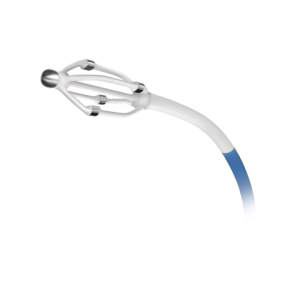by
Nancy Ryerson, Staff Writer | February 19, 2013

The St. Jude Medical
EnligHTN(TM) Renal Denervation System.
Renal denervation therapy has been found to reduce high blood pressure, but until now, no studies had been done on the long-term effects of the treatment for preventing hypertension. St. Jude Medical has launched a new study that will measure the impact of its EnligHTN Renal Denervation System on cutting the risk of heart attack and stroke in hypertension patients.
St. Jude Medical's minimally invasive therapy uses radiofrequency energy to disrupt the renal nerves and cause blood pressure to decrease.
"Initial study results have demonstrated that the EnligHTN Renal Denervation System is safe and effective in rapidly lowering blood pressure. If these results extend into the prevention of major cardiac events, there is the potential to dramatically change how we treat these patients," said Professor Thomas Lüscher, chairman, cardiology and cardiovascular center at the University Hospital in Zurich, Switzerland, a principal investigator for the trial, in a statement.



Ad Statistics
Times Displayed: 2147
Times Visited: 10 Fast-moving cardiac structures have a big impact on imaging. Fujifilm’s SCENARIA View premium performance CT brings solutions to address motion in Coronary CTA while delivering unique dose saving and workflow increasing benefits.
Globally, 13 percent of all deaths can be attributed to high blood pressure, according to the World Health Organization, including 51 percent of deaths from stroke and 45 percent of coronary heart disease deaths.
A previous study found that patients with drug-resistant hypertension respond quickly to the St. Jude Medical EnligHTN system. After thirty days, blood pressure reduction of 26 mmHg points remained stable six months after treatment. With every decrease of 20 mmHg, the risk of cardiovascular death drops by half.

